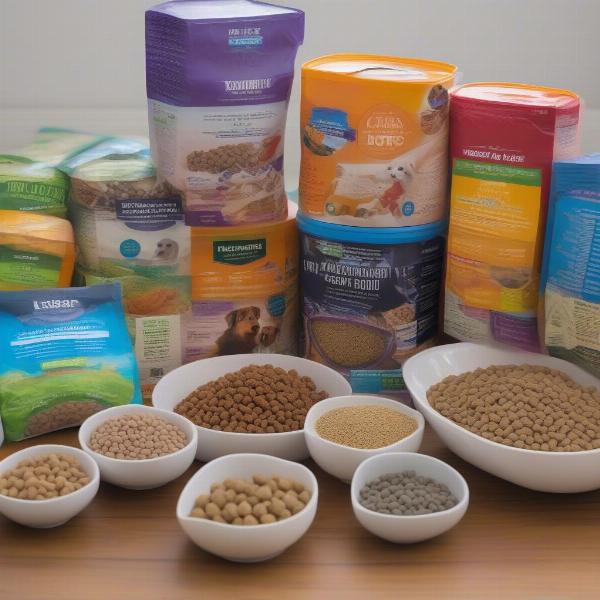The phrase “lazy dog vegan” might seem contradictory. Lazy Dog Restaurant & Bar is known for its comfort food, while veganism focuses on plant-based eating. However, more and more dog owners are exploring vegan diets for their furry friends. This article dives into the world of vegan dog food, addresses the complexities of a plant-based diet for dogs, and provides practical tips for those considering this dietary approach. We’ll also look at vegan options available at Lazy Dog Restaurant for humans, should you want to enjoy a meal out with your pup.
Navigating the Vegan Dog Food Landscape
Choosing a vegan diet for your dog requires careful consideration and consultation with a veterinary nutritionist. Dogs have specific nutritional needs, and while they can technically survive on a plant-based diet, ensuring it’s complete and balanced is crucial. Deficiencies in essential nutrients like taurine, L-carnitine, and certain vitamins can lead to serious health issues.
 Vegan Dog Food Options
Vegan Dog Food Options
A complete and balanced vegan dog food should be formulated by a veterinary nutritionist and contain all the necessary nutrients your dog needs. Look for brands that have undergone AAFCO (Association of American Feed Control Officials) feeding trials, as this indicates the food has met certain nutritional standards. Don’t hesitate to ask your veterinarian for recommendations and guidance.
Essential Nutrients for Vegan Dogs
Key nutrients to watch out for in a vegan dog food include protein, essential fatty acids, calcium, phosphorus, and vitamins like B12 and D. Plant-based protein sources like soy, lentils, and chickpeas can provide adequate protein, but the amino acid profile must be carefully balanced.
Supplementation might be necessary to ensure your dog receives all the essential nutrients they require. Always consult with your veterinarian before starting any supplements to determine the appropriate dosage and avoid potential overdosing.
Transitioning to a Vegan Diet
If you’re considering switching your dog to a vegan diet, a gradual transition is key to avoid digestive upset. Start by incorporating small amounts of vegan dog food into their current diet and slowly increase the proportion over several weeks. Monitor your dog closely for any changes in stool consistency, appetite, or energy levels.
Is a Vegan Diet Right for Every Dog?
While some dogs thrive on a vegan diet, it’s not suitable for all. Puppies, pregnant or lactating dogs, and dogs with certain medical conditions might have higher nutritional requirements that are difficult to meet with a plant-based diet. Always discuss your dog’s individual needs with your veterinarian before making any dietary changes.
What are the potential benefits of a vegan diet for dogs?
Some potential benefits include improved digestion, healthier skin and coat, and reduced allergies. However, these benefits are not guaranteed and depend on the individual dog and the quality of the vegan diet.
What are the potential risks of a vegan diet for dogs?
Potential risks include nutritional deficiencies if the diet is not properly balanced, digestive issues during the transition period, and potential food sensitivities.
Where can I find vegan dog food?
Vegan dog food is becoming increasingly available in pet stores, online retailers, and even some veterinary clinics.
Lazy Dog Restaurant: Vegan Options for Humans
While Lazy Dog Restaurant doesn’t offer a specific vegan menu for dogs, they do have several plant-based options for humans! You can enjoy a delicious vegan meal while your furry friend relaxes by your side on their dog-friendly patio. Check their menu for current vegan offerings.
Conclusion
A vegan diet for dogs can be a viable option, but it requires careful planning and monitoring. Consult with your veterinarian or a board-certified veterinary nutritionist to ensure your dog’s nutritional needs are met. Remember, a balanced and complete diet is essential for your dog’s health and well-being. While exploring vegan options for yourself at Lazy Dog Restaurant, remember to prioritize your dog’s nutritional needs with a carefully selected and vet-approved diet.
FAQs
- Can puppies eat a vegan diet? It’s generally not recommended to feed puppies a vegan diet as their nutritional needs are very high during growth.
- What are some good sources of plant-based protein for dogs? Soy, lentils, chickpeas, and quinoa are good sources of plant-based protein.
- Do I need to supplement a vegan dog’s diet? Supplementation is often necessary to ensure a vegan dog receives all the essential nutrients.
- How do I transition my dog to a vegan diet? Gradually introduce vegan dog food into their current diet over several weeks.
- Is a vegan diet more expensive than a traditional dog food? The cost of vegan dog food can vary depending on the brand and ingredients.
- What if my dog doesn’t like vegan dog food? There are many different brands and flavors of vegan dog food available. You may need to experiment to find one your dog enjoys.
- Can I make homemade vegan dog food? While possible, it’s challenging to formulate a complete and balanced homemade vegan dog food. Consult with a veterinary nutritionist for guidance.
Related Articles on ILM Dog
About ILM Dog: ILM Dog is your trusted resource for expert advice on all aspects of dog care, including breed selection, health, nutrition, training, and grooming. We provide practical, up-to-date information to help you provide the best possible care for your canine companion. From understanding specific breed needs to choosing the right diet, our experts are here to support you. For personalized advice on your dog’s nutrition, contact us at [email protected] or call us at +44 20-3965-8624.